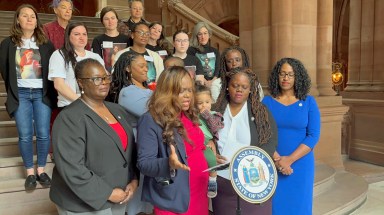Bichotte Hermelyn, Webb address maternal and infant mortality crisis during Black Maternal Health Week

State Assemblywoman Rodneyse Bichotte Hermelyn, State Sen. Lea Webb, other lawmakers, maternal healthcare experts and advocates on Monday convened at the New York State Capitol Building during Black Maternal Health Week to rally for legislation and action addressing the maternal mortality crisis.
The issue includes what they described as “the shocking spike in infant mortality and deadly health disparities disproportionately damaging Black mothers.”
New York State legislators spoke on advancing a Maternal Health Equity Agenda: sweeping legislation to combat skyrocketing maternal and infant mortality rates in New York, tackle racial and socioeconomic disparities, and create comprehensive reforms addressing the crisis’ leading causes.
The Maternal Health Equity Agenda includes legislation to address this crisis through comprehensive actions combating the unacceptable racial disparities in maternal mortality.
Also focusing on the 7th Annual Black Maternal Health Week’s theme of “Our Bodies STILL Belong to Us: Reproductive Justice NOW!” elected officials emphasized the national importance of their legislation to expand reproductive rights while they are rapidly restricted in many states across the country.
“This Black Maternal Health Week, I am proud to join Assemblymember Bichotte Hermelyn, colleagues, and advocates to introduce the Maternal Health Equity Agenda,” said Webb, chair of the Senate Women’s’ Issues Committee. “Here in New York, we are facing a maternal and infant mortality crisis and the stakes could not be higher for Black mothers, their infants, and their families.
“This legislation will ensure equitable access to comprehensive healthcare, timely prenatal care, safe birthing experiences, comprehensive postpartum care, and reproductive health services, ensuring that New York is a safe and supportive environment for mothers and babies,” she added.
Bichotte Hermelyn, the Haitian-American chair of the Brooklyn Democratic Party, said: “When you’re pregnant, it’s the start of new beginnings, a celebratory time, but the healthcare system is failing Black families, leaving women and their infants to wonder if they will leave the hospital alive.
“We keep hearing grim statistics: women in America are dying at a higher rate from pregnancy-related causes than women in any developed nation, while Black women are three times more likely to die from pregnancy-related causes,” added the representative for the 42nd Assembly District in Brooklyn.
“During Black Maternal Health Week, I’m proud to join my colleagues as we meet the moment for safer motherhood, and take action through legislation that holistically tackles the inequities and injustices so we can make motherhood safer for all New Yorkers,” she continued.
Sen. Cordell Cleare said: “I commend Sen. Lea Webb and Assemblywoman Rodneyse Bichotte Hermelyn, who are two of our greatest legislative champions.
“Furthermore, I am proud to support and co-sponsor many of the bills on your agenda today, including legislation to expand Medicaid coverage for pregnant and postpartum individuals and their children; requiring the advisory council on maternal mortality and morbidity to undertake a review of the cesarean births; and establishment of a maternal mental health workgroup,” she added.
Sen. Samra Brouk said she was “grateful to stand shoulder to shoulder with my colleagues as we advocate for the inclusion of our Maternal Health Equity Agenda in this year’s budget.
“We are facing a maternal and infant health crisis in New York, and like many other issues, Black women and their families are paying the price,” she said.
“Our state has an obligation to act to ensure that all birthing people receive the care and support they need to thrive, which includes prioritizing access to doula care, maternal mental health treatment, and so much more,” Brouk added. “Together, we can make the necessary investments to give new and growing families the resources they need to have for safe and healthy futures.”
Sen. Roxanne J. Persaud, the Guyanese-born representative for the 19th Senate District in Brooklyn, said, “Black Maternal Health Week brings awareness to the unfortunate reality that black mothers are disproportionately affected by inequities in the healthcare system.
“Though we have taken great strides at addressing these recently, more must be done quickly,” she said. “Only then can this week be about simply celebrating motherhood and the joy of childbirth.”
The Maternal Health Equity Agenda comprises several legislation, including: Maternal Health Care and Birthing Standards Workgroup (S7702A Webb/A8207A Clark); Maternal Care Mobile App for Medicaid Recipients (S7700A Webb/A08230 Paulin); Reproductive Health Care Facilities and Religious Worship Access Act (A04596 Bichotte Hermelyn); Coverage for Transvaginal Ultrasounds (S05579 Scarcella- Spanton/A06042 Bichotte Hermelyn); Maternal Depression Screenings to New Moms (S2039A Brouk/A02870 Solages); Reproductive Freedom and Equity Grant Program (S348C Cleare/A00361 Gonzales-Rojas); Special Enrollment Period Protections (S201 Cleare/A02656 Walker); Uterine Fibroid Awareness Campaign (S3219A Cleare/A01087 Joyner); Ban on Carcinogenic Substances from Menstrual Products (S3529A Fernández/A05990 Rosenthal); Hospital Transparency Act (S1003A Hinchey/A00733 Rozic); and Stillbirth Protocol + Database (A07204 Bichotte Hermelyn).
This year marks the seventh anniversary of the Black Maternal Health Week Campaign. In, 2021 President Joe Biden signed a proclamation that established Black Maternal Health Week to highlight the racial disparities in maternal mortality rates in the United States.
Founded and led by the Black Mamas Matter Alliance, Black Maternal Health Week is an initiative aiming to deepen the conversation around Black maternal health in the US and advance solutions.
“Our Bodies STILL Belong to Us: Reproductive Justice NOW!” is this year’s theme – spotlighting the widespread restrictions on abortion care access coupled with rising cases of criminalization due to pregnancy loss, which continue to widen the gaps of adverse maternal and birth outcomes in the US.




